
The COVID-19 pandemic has changed the typical University of Nebraska–Lincoln student experience in a myriad of ways. Students are regularly tuning in to Zoom lectures remotely, submitting assignments online and are struggling to network in the community and with their course peers.
For the Department of Community and Regional Planning’s Environmental Planning and Policy course, instructor Belinda Fowler wanted to alleviate some of the challenges with working remotely. She utilized a local flood mitigation project to enable students to meet one another in person and learn from a field visit. Students also heard from a guest speaker from the Washington, D.C., office of the U.S. Army Corp of Engineers.
“Students just need a break from Zoom and need to connect the dots from the textbook to real-world examples,” Fowler said.
The class met at Trago Park pavilion, along the Antelope Valley Creek Floodway Sept. 30. Students shared the learning concepts related to their recent field work assignment with guest speaker Gwyn Jarrett, who works as a professional planner for the Flood Risk Management Program in the Army Corp of Engineers.
Jarrett is also a Nebraska alum who “wanted to give back locally” as she was preparing for another speaking engagement. Jarrett spoke on a study and project near Denver which spans portions of Wyoming, Colorado and Nebraska that directly impact headwaters and streams that eventually reach Nebraska. She addressed topics of ecosystem restoration principles along the South Platte River, flood risk management along the Weir and Harvard Gulch floodways, and the associated tributaries in and around Denver.
The study and project implementation was done in response to a resolution passed by the Committee on Transportation and Infrastructure through the U.S. House of Representatives. Students learned about the importance of public engagement, public/private partnerships, the role of government, project costs and the factual basis required for future planning efforts. Additional topics discussed included flood impacts, mitigation strategies, water quality and economic considerations of implementing a project spanning multiple states and local jurisdictions. Jarrett also spoke on the importance of networking and will be a resource for students in the future.
“This was great! It was so nice to get out away from Zoom, meet my classmates and actually do some learning in the field,” said Sean Nedabylek, a graduate student in the course.
Fowler thanked the students and Jarrett for continuing to follow CDC guidelines and enhancing the student experience amidst the challenges of learning “outside of the norm” during the pandemic.







